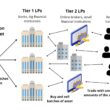Protect your company data and stop cyberattacks by following this five-step guide for businesses.
Cybercrime is no longer something that you can brush to one side and ignore. It’s now become one of the biggest threats to businesses all around the world — and you need to protect your company from it.
The main reason why this is so important is because of your company data. There’s nothing cybercriminals love more than company data, whether it’s bank details or research and development (R&D) information. Once a group of cybercriminals has managed to successfully steal your data, they can use it to their advantage, whether it’s by selling it to the highest bidder on the dark web or holding you to ransom for a large sum of money.
Now that you know this, it’s time to take action. Start by following this five-step guide that’s specifically designed to help all businesses, from startups to big organizations, protect their data from dangerous cyber criminals.

Step 1: Use Open-Source Security
It’s no secret that open-source software is everywhere these days. According to ZDNET, nine out of ten companies now use open-source software.
As great as open-source software can be for saving money and boosting productivity, it does come with several drawbacks. The biggest drawback of them all is that it leaves businesses more vulnerable to cyberattacks. Thankfully, there’s an easy solution, which is to use Open Source Security. This way, your vulnerabilities can be identified (and addressed) much faster before they cause any harm to your company.
Step 2: Implement a Zero-Trust Framework
Next, implement a zero-trust framework throughout your entire company and all of its applications. In a nutshell, a zero-trust framework is when you assume that your network’s security is always at risk of being hacked. Because of this, all company users, from new employees to management team members, must verify who they are every time they try to log into an application.
When a zero-trust framework is in place, it naturally means that people outside of your company (such as cyber criminals) will find it much harder to steal your data. It’s impossible for them to verify themselves due to not being official employees, which means your data is much better protected than it was before.
Step 3: Use Strong Passwords
Despite cybercrime now being recognized as one of the biggest threats to businesses around the world, millions of employees still make the fatal mistake of using weak passwords across their company accounts. This is something that cybercriminals love, as it makes life that extra bit easier for them when they use password-cracking techniques.
Step 4: Encrypt Your Data
The next step is to encrypt your data. One of the most popular methods that businesses use for this is the Advanced Encryption Standard (AES), which is a cipher that you can use to protect your data from prying eyes when transferring data online. Essentially, it means that criminals can’t read the data that you’re transferring, making it essentially useless to them.
Moving into the future, data encryption is going to be one of the main methods used by modern-day companies to keep their data sensitive data secure and protected. For example, Taiwan Semiconductor Manufacturing Company Ltd (TSMC) is already making changes to how it operates. TSMC is one of Apple’s main suppliers and was recently the victim of a cyberattack by LockBit, a Russian cybercriminal group, which caused some of their data to leak. The key lesson here? It doesn’t matter how small or big your company is: anyone can fall victim to cybercrime and data breaches.
Also Check Out: blockchain developer training to get started with your blockchain learning journey!
Step 5: Conduct Background Checks on Employees
The fifth and final step is just as important as all of the others: conduct better background checks when you’re hiring new employees. Data theft by employees is becoming a big problem in the business world. Despite this, many business owners continue to overlook this problem, as they assume it won’t happen to them.
If you’re concerned about future employees potentially stealing your company data (and even handing it over to industry rivals), then the best strategy you can follow is conducting better background checks. You can also use restrictive covenants when employees sign contracts with you so they can’t join rival companies after leaving your organization (think of this as an extra layer of security).
Also Read: The Importance of a Cryptocurrency Liquidity Provider
Final Thoughts — Keep Your Company Data Protected
Over the coming years, it’s absolutely vital that you keep your company data secure and protected. Otherwise, you run the risk of experiencing a cyberattack where some — or potentially all — of your valuable data is stolen. When this happens, it can then lead to financial damage, unhappy customers, and various other problems, which you naturally won’t want to happen.
Fortunately, it’s now much easier to protect your company data than it was back in the 2000s and 2010s. By following the low-cost cybersecurity steps provided above, you can protect your company data from cyber criminals and operate as other successful businesses do.




